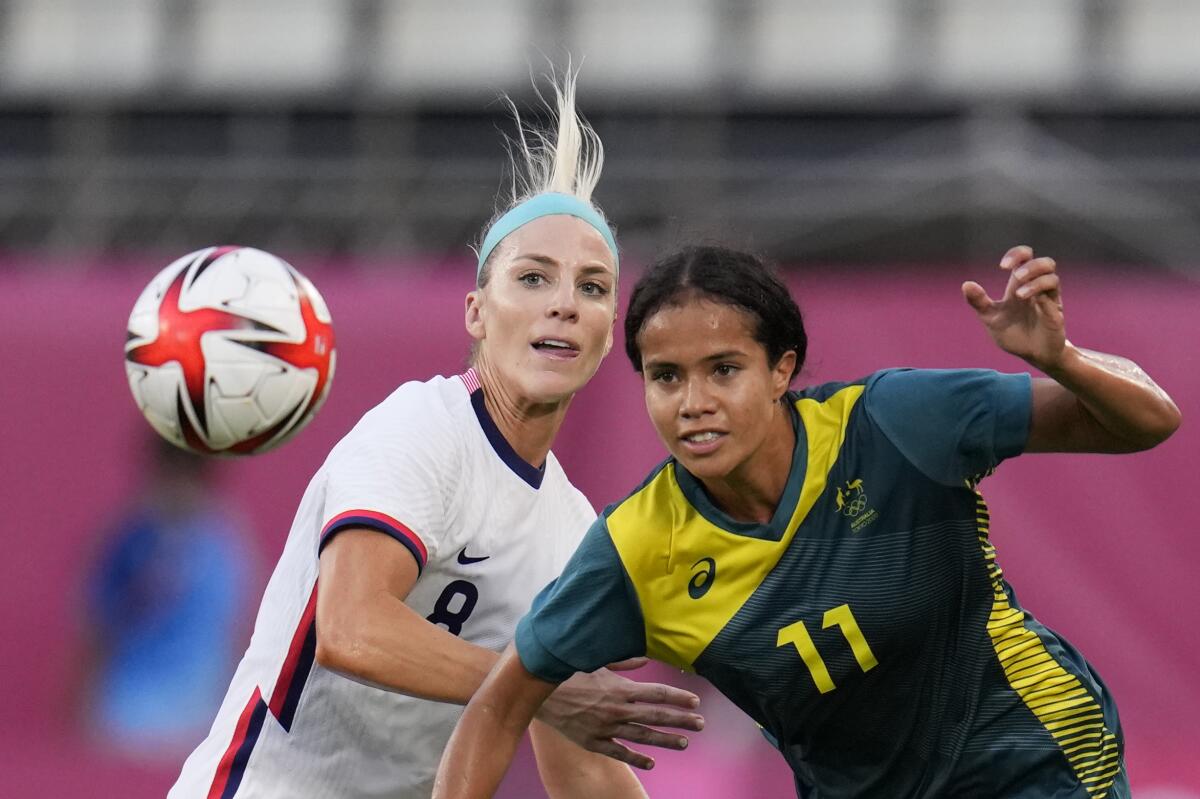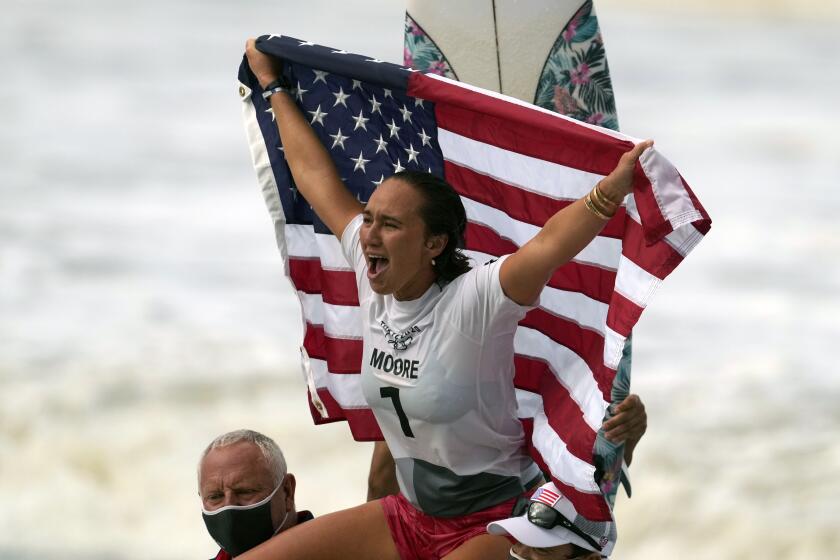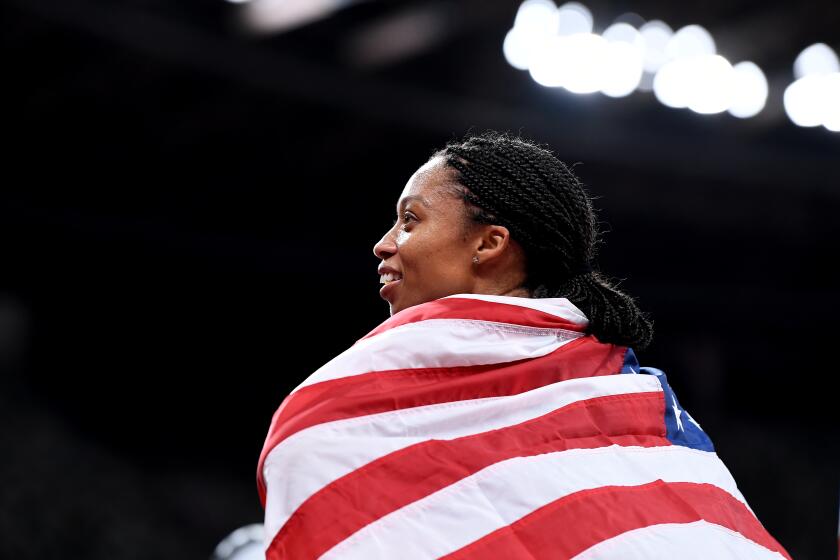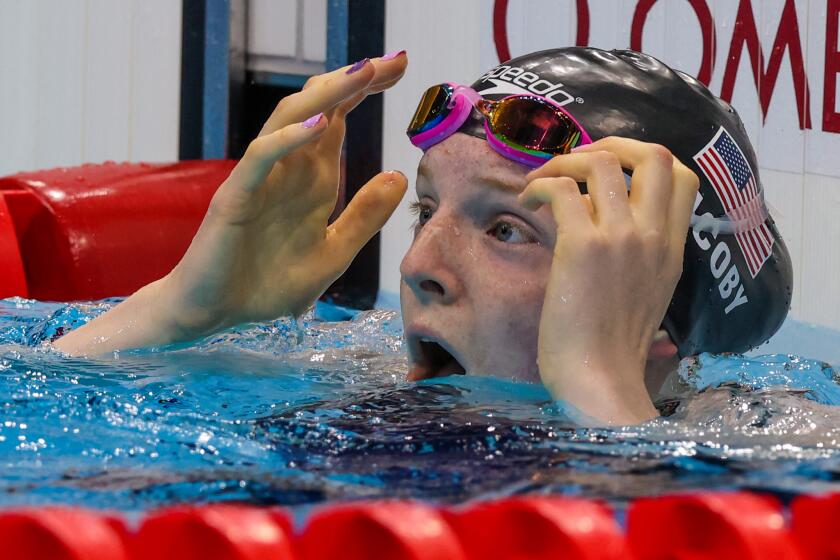U.S. women’s soccer team narrowly advances after draw with Australia

- Share via
TOKYO — The highest-scoring team in women’s soccer history was told to play defense Tuesday. The high-stakes gamblers were suddenly as conservative as a red-state politician.
For a U.S. team that has regularly risen to the occasion in international championships, Tuesday’s scoreless tie with Australia must has been as difficult to play as it was to watch.
But for coach Vlatko Andonovski, managing in a major tournament for the first time in his career, a draw was all the U.S. needed to get through to the knockout round of the Tokyo Olympics tournament. And seeing no need to get greedy, that’s what he played for, backing his team into Friday’s quarterfinals in Yokohama against the Netherlands in what will be a rematch of the last Women’s World Cup final.
But just because Andonovski’s plan worked doesn’t mean it was successful. In the postgame news conference, as the coach praised his team for executing his unorthodox strategy, forward Alex Morgan, sitting beside him, smirked.
Carissa Moore became the first woman to win a gold medal in surfing at the Olympics, defeating South Africa’s Bianca Buitendag.
“We came with the mindset that the first goal was to win the game,” Andonovski said. “And the second goal was to put in a good professional performance and not get scored on. Obviously we didn’t accomplish the first goal, but we did accomplish the second one, which was very important because ultimately it put us in the same place.”
Maybe. But playing for a tie was out of character for a team that hadn’t lost in Andonovski’s first 23 games as coach but has won just once in three games since arriving in Japan.
It was out of character for a team that had been averaging nearly 3 ½ goals a game this year and hadn’t been shut out in more than four years but has been held scoreless twice in three games since getting to Tokyo.
On Tuesday they were blanked by a team that had won just once in seven games in 2021 and given up fewer than two goals just twice. That, too, was out of character.
“They were a bit passive in their pressing,” said Australia coach Tony Gustavsson, an assistant on the Americans’ World Cup-winning teams in 2015 and 2019. “I’m used to seeing them very, very aggressive.”
News, results and features from The Times’ team of 12 reporters who covered the Tokyo Olympic Games in the summer of 2021.
Instead, the U.S. was content to let Australia control the ball for nearly 60 of the 90 minutes, outshoot them 10-8 and complete more passes than the Americans even attempted.
As a result, the U.S. (1-1-1) closed the first round with just four points, the fewest it has earned in the group stage of any world championship tournament. And it finished second in its group for the first time in an Olympic tournament since the inaugural one in 1996.
The gold standard in Olympic soccer after winning four of the first five tournaments, the U.S. has won just one of its last five games in Olympic play. It leaves it with a difficult path through to the final, starting with the Netherlands, which scored 21 times in its three group-stage games in Japan. The U.S. hasn’t even taken 21 shots on goal in the tournament.
“You can’t think about really future games without thinking about the next game,” Morgan said. “So for us, it’s looking at the upcoming games and seeing who we’re going to face. And then after that, it’s, you know, seeing how Vlatko wants us to set up against that team.
“We’re experienced enough and professional enough to be able to do so. We’ll look forward to that now. Obviously we need to build off of this momentum as well.”
But the U.S. really has no momentum after two lackluster, error-ridden efforts in seven days sandwiched around a win over New Zealand in a game that was close until the final 10 minutes.
Tuesday’s game in Kashima, a little more than an hour outside Tokyo, was the first the U.S. has played before fans with several dozen children, in school uniforms and smart track suits, sitting behind one goal waving small American flags.
“It was wonderful to have some fans — to have somebody — in the stands clapping and cheering a little bit,” Morgan said. “It’s challenging to play in front of an empty stadium. So it was a nice surprise for us.”
Morgan gave them something to cheer about in the 31st minute, leaping to head in a Kelley O’Hara cross. But she was ruled to be a hair offside, a call referee Anastasia Pustovoitova confirmed after checking with video-assistant referee Bibiana Steinhaus-Webb.
Lydia Jacoby becomes the first U.S. woman to win gold in swimming at the Tokyo Olympics, pulling away late to win the 100-meter breaststroke.
Australia’s best chance came in the 17th minute when Mary Fowler’s header from the center of the box cleared the outstretched hand of leaping U.S. goalkeeper Alyssa Naeher but bounced off the crossbar.
Australia was on the front foot all night while the U.S. continued to shoot itself in the foot, holding back when it should have been pushing forward.
“It felt like we were in control in a lot of moments,” Gustavsson said. “With and without the ball. We had a lot of dangerous set plays in the first half.
“At the end of the game, maybe the tie was fair.”
Andonovski certainly thought so. But it’s probably best not to poll the rest of the people in his locker room.
More to Read
Go beyond the scoreboard
Get the latest on L.A.'s teams in the daily Sports Report newsletter.
You may occasionally receive promotional content from the Los Angeles Times.










